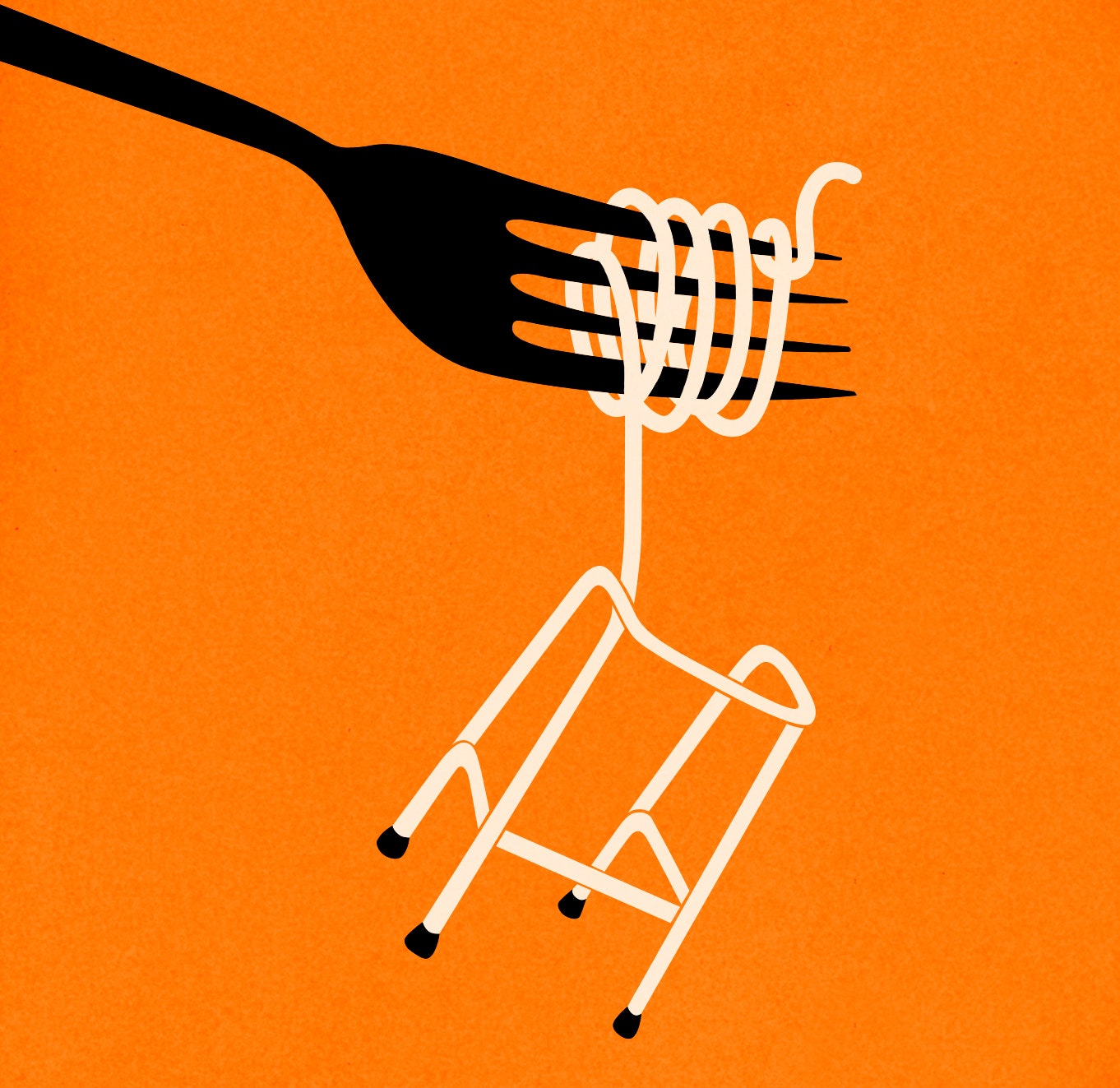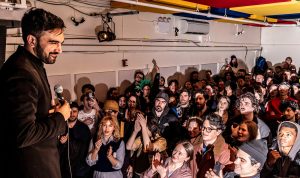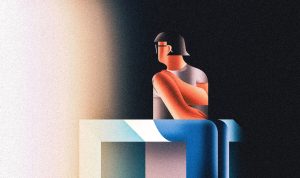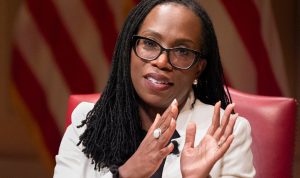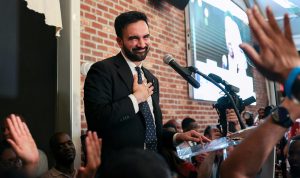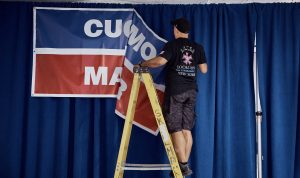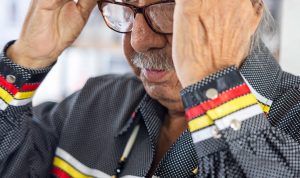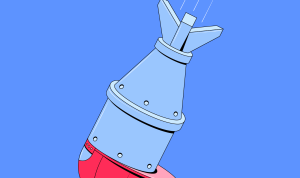The year my sister Amy was invited to play Mrs. Claus in the Macy’s Thanksgiving Day Parade was the same year Hugh had his hip replaced.
“It somehow makes sense that these two things are happening within a week of each other,” I said.
“Except I’m not doing it,” Amy told me.
It was nearly midnight, and we were in my apartment in New York, gathered in the living room. The view from the window looked like the backdrop of a talk show—a jumble of tall buildings with thousands of lit windows, some of them winking. “How can younotplay Mrs. Claus?” I asked.
Amy ticked the reasons off on her fingers. “One: they want me there at 3a.m.Two: it’s supposed to rain. And three: they’re not paying me anything.”
“Macy’s doesn’t pay Mrs. Claus?” I asked, surprised in the same way I’d be if I’d learned that she—Mrs. Claus—had been married before, maybe to another woman, like, “What? That can’t be true!”
With us in the living room were two Frenchmen whom Hugh and I know from Normandy: Olivier, who owns a donkey and had been teaching himself English with Duolingo, and David, who also has a donkey but spoke no English whatsoever. Still, he could understand by my tone that something outrageous was happening.
“Qu’est-ce qui se passe?” he asked.
“The department store that calls itself the House of Macy will not give money to the bride of Father Christmas,” I said in French. “For us, this is unacceptable!”
Olivier and David had arrived a week earlier and were staying with us until the Saturday after Thanksgiving. It was their first trip to New York, and they were overwhelmed by how loud and crowded the city was. My sister Gretchen, who lives in North Carolina, was also staying with us, and while I was happy to see her and our French friends, I’d just returned from a long tour and had not had any time alone—or alone with just Hugh—since mid-September. We have a good deal of room in our New York apartment. It’s not like anyone was sleeping on a sofa or hanging wet towels off the doorknobs. I just resented having to adjust my schedule. House guests meant less time at my desk, both in the morning and in the evening, when, mainly because of Gretchen, we had to eat dinner earlier than usual. I can put up with a lot, but when my work schedule is interrupted I get antsy. It didn’t help that just four days after Gretchen was due to leave, Hugh would be checking into the hospital for hip surgery. “And don’t think I’m not going to need you,” he said over Thanksgiving dinner.
A whiz in the kitchen, Hugh makes all our meals, and when I suggested that he could probably still manage—“I’m sure other people have. Can’t you cook, like, from a wheelchair or something?”—he said, “No,you’regoing to do it. Three times a day and for as long as I need you to.” He poured himself a glass of wine. “I could be out of commission for months!”
“Yes, but you don’t know that for a fact,” I reminded him. “I’m sure there are people who recover from a hip replacement in a matter of days. You just don’t hear about them.”
David asked what we were talking about, and I said, in French, “After the hospital, he wants to make a strike!”
However difficult Hugh’s operation would be, I doubted that it could be worse than the year and a half leading up to it. There was no one day he started complaining about his pain—he’s always done that to some degree. Rather, it shifted from his back or his sciatica to his hip, then stayed there and intensified.
“Ow!” he’d cry, wincing as he sat down at the lunch or dinner table, as he bent before the oven or even looked at a stepladder. Hugh never says anything so simple as “I have a headache,” or “My finger hurts.” Instead, he describes his pain in detail, the way he might to a doctor who’d just said, “Tell me everything, and I want you to be as specific as possible.”
I know when Hugh is on the phone with his mother because all his talk will be about his sore wrist, his swollen joint, the cut on his foot. When I offer to get him an ice pack, an ibuprofen, a Band-Aid, he’ll say in a voice that is weak but also bitter, “That’s O.K. I’ll get it myself later if I need to.”
“They don’t hand out medals for needless suffering,” I’ll remind him.
“You don’t know what it’s like,” he’ll tell me.
I know all about kidney stones and gum surgery. I know about broken ribs and urinary-tract infections. When it came to hip pain, though, he had me.
His groaning would sometimes wake me in the middle of the night.
“Listen,” I’d tell him, “if I could take your pain and suffer it myself, I would, if only to get a decent night’s sleep.”
This went on day after day, until I could no longer remember its absence.
Hugh became a non-stop grouse. Ghosts in movies moaned less than he did. Still, it took a lot to get him to see a specialist. “The doctor said it’s bone on bone,” he reported after returning from his appointment. “Do you have the slightest idea of what that feels like?”
Two months after Thanksgiving, Hugh would turn sixty-five and be eligible for Medicare, but even that was too long to wait. Luckily, we have health insurance, and it appeared that our plan would cover the brunt of the cost. And so, in what seemed like very little time, he was scheduled for surgery at one of the hospitals within a short walking distance of our apartment. There are a number of them, so many that when our friend Tracy was looking for a place on the Upper East Side, and we suggested our part of it, she instead chose to get something thirty blocks north. “All the Google Street Views I looked at in your neighborhood showed people who were crying,” she told us.
It’s something I hadn’t noticed until she said it. Then I thought,She’s right!If our sidewalks are clean, it’s likely due to a steady downpour of tears, mostly in the vicinity of Memorial Sloan Kettering.
The place Hugh went to was called the Hospital for Special Surgery. “It’s the best,” his doctor said, as did many of the retired residents in our building who’d had their hips and knees and shoulders replaced there. “If you need a walker or a wheelchair, just ask,” any one of them would tell us. “I’ve got one in the basement!”
A neighbor said that she still had some painkillers left. Another offered to loan us her comfort-height toilet seat. Hugh passed, but wound up buying his own. “The doctor says I’ll need it,” he told me.
The sight of the puffy, foot-tall toilet seat in our home was too much for me, a spectre of death no less chilling than the Grim Reaper himself. I said, “Next, bring in a coffin, why don’t you.”
The day before his surgery, Hugh talked to his older brother John in Washington State, then limped into my office to recap their conversation. “He said he really wished he was here to help take care of me.”
I looked up from my laptop. “Call him back.”
“I don’t know that he reallymeantit,” Hugh said.
I handed him my phone. “Sure he did, call him. Do it now.”
“John can’t afford a last-minute ticket across the country,” Hugh told me. “And I know for a fact that he won’t want to drive three hours from his house to the Seattle airport.”
“He won’t have to,” I said. “Call him.”
That was at 3p.m.New York time. By five, a hired car was heading to Port Angeles to collect Hugh’s brother, and by midnight John was in a first-class seat to J.F.K., where another car would be waiting to deliver him to our apartment.
I said to Amy, “It’s worth every penny.”
I like all of Hugh’s siblings. Each is creative in his or her own way. John, for instance, can make a sculpture out of anything. Hand him an empty sardine tin, three chopsticks, and a broken calculator, and he’ll turn them into something remarkable. He’s a wonderful writer as well, and a huge reader. John is warm and inquisitive. He’s bighearted and energetic, and I’d always looked forward to his visits, especially now. “He can cook, right?” I asked.
“Well, sure,” Hugh said, “but it’s just regular stuff he makes for his grandkids. Pork chops, macaroni and cheese, that kind of thing.”
“That’ll do,” I told him. “At least until you can stand on your feet long enough to pan-fry scallops.”
John hadn’t yet arrived when I collected Hugh’s overnight bag and accompanied him to the hospital for his operation. For years, I’d heard horror stories about American health care, but this place was first-rate. After checking in, we were led to a small, spotless room with curtains for walls. There was an examining table set up, and, once Hugh had changed into a medical gown, we were visited by six staff members, starting with a nurse who inserted an I.V. into the back of his hand and cleaned out his nose with iodine. An aide shaved and then washed the hip that needed replacing. Then came another nurse, who took a vial of Hugh’s blood and asked a series of questions, including “When did you last have a bowel movement?”
I put my fingers in my ears and made the noise of a hundred thousand bees.
“Are you O.K.?” the young woman asked.
“We don’t do things like that,” I told her, rocking back and forth, my fingers still in my ears.
“We don’t have bowel movements,” I explained. “The bathrooms at our house are for soaking in the tub and brushing our teeth—that’s it. Nothing else has ever happened there.”
I know couples who sit on the toilet with the door open, who merrily pass gas in front of each other and discuss their evacuations in graphic detail. But Hugh and I are not those people. Hearing his answer to the nurse’s question could have possibly destroyed me, and so I kept my fingers in my ears until she left and the anesthesiologist arrived. Then came another nurse and, finally, the surgeon—Dr. Reif—who, we learned, had just amputated a leg.
Sitting in the curtained-off room, listening as patients to the left and right of us were asked about their bowel movements, too, I realized that I had never seen Hugh frightened before. “You’ll be fine,” I told him, patting his hand and noticing for the first time that it had age spots on it.
At 11a.m., right on schedule, a gurney pulled up. Hugh was outfitted with a bonnet, and, after he was wheeled away, I went home to meet John, who has visited us in France and England but, like Olivier and David, had never before been to New York. All the Hamrick brothers are handsome, though in slightly different ways, like dogs born in different litters to the same purebred parents. John’s jaw is squarer than Hugh’s and Sam’s, and his thick hair, even as he turns seventy, has hardly any gray in it. His gait is looser, and he’s more affectionate, always ready to lay a hand on your shoulder, and perhaps surprise you with a kiss on the cheek.
“Ick,” I said, when we greeted each other. “Get off me!”
Walking from my apartment to the Morgan Library, where we would have lunch, took three times as long as it normally would because John kept stopping in the middle of the sidewalk to look up: “Wow. Did you see the detail on that building?”
A woman slammed into his back, the way I myself have done a thousand times when a tourist, oblivious to the people around him, quits moving in order to gawk and point.
“You could at least apologize!” John shouted after her once she’d skittered around him, muttering.
We were eating when the surgeon called to say that he had finished, and that there had been no complications.
It hadn’t occurred to me that anything might have gone wrong, though I suppose it easily could have. Eight years earlier, John’s wife—a woman he’d been with since he was fourteen, the mother of his child—died of a blood clot after breaking her leg. Totally unexpected, and his entire life was derailed. I’m still not sure how he makes it from one day to the next, and in such good humor. Time helps, I imagine, as do all the philosophy books he reads. For a while, he saw a therapist. Now he dates a woman who lives down the street from him and makes her own greeting cards.
It’s amazing how quickly doctors can get hip-replacement patients back on their feet. The morning after the operation, John and I entered the hospital and found Hugh shuffling down a hallway. He had a physical therapist by his side and was using a walker—but still!
Getting him home a short time later involved a thick cushion and a car with plenty of legroom. “Ow!” he said whenever I tried to help. “You’re making everything worse!”
In the apartment, he steered his walker toward the bed. “I’m going to need you to take my shoes off,” he said to me, adding, as I began to do so, “Slowly! Now put my slippers on—not like that!! Get me my shoehorn!”
He needed a blanket, his phone, a glass of water. “Notthat muchwater!” he complained when I handed it to him. There were prescriptions to be picked up, and sickroom equipment—for instance, an adjustable stool he’d need when getting in and out of bed. I went to four different places looking for one. At CVS, I came upon a well-dressed white-haired woman who had in her shopping cart a pack of wet wipes and eight quart-size cartons of half-and-half.
“God, that’s a lot of half-and-half,” I said to her. “Who on earth needs that much?”
“I’m having guests,” she snapped, and I scurried away.
That evening, I went with Amy to our friend Mike’s for dinner.
“I can’t believe you’re abandoning me,” Hugh said as I dressed to leave.
I reminded him that it had been on the calendar for months. “And I’m notabandoningyou—John is here.”
It was nice to get away, if only for a few hours. To have someone bringmebowls of nuts and glasses of water. At the table, I mentioned the lady who’d growled at me at CVS. Then Mike told us about a woman who’d spotted Ted Koppel carrying a basketful of avocados at a farm stand in Maryland.
“None of your goddam business,” he reportedly answered.
I recapped the evening for Hugh the following morning, saying that there were plenty more parties coming up. “Hopefully, you can come with me to Antonio’s Christmas lunch in two weeks. We had so much fun last year, remember?”
“Two weeks!” Hugh gestured toward his outstretched leg. “Look at me! Are you out of your mind?”
John, who had gone that morning to buy a juicer, set a glass of something that poured like wet cement in front of his brother and raised his voice, which was unlike him. “My God, David. He’s just had major surgery!”
I raised my voice in return. “Well, excuse me! I thought that eventually hemight get better!”
By outsourcing Hugh’s care, I had shut myself out of his recovery. Now I wanted back in, but it was too late. After saying, “Whatever you do, don’t give him a bell,” Amy brought Hugh an empty can she’d put a few quarters in.
Clang,clang,clang, I’d hear while sitting at my desk.Clang, clang.
“How can I help?” I’d ask, racing into the bedroom.
“John is downstairs,” Hugh would say. “Go get him and tell him I need to put my socks on.”
I’d roll up my sleeves. “I can do that for you.”
The two were inseparable, and would convene each morning to dissect their dreams. “So I’m back in Port Angeles under a pitch-black sky, frying—get this—pennies in a skillet,” I caught John saying a week after his arrival, as he sat on the edge of the bed, massaging oil into Hugh’s feet. “I might be wrong, but I’m interpreting this to mean I could use more copper and iron in my diet.”
At meals, the brothers would reflect on their childhoods in Africa. “Remember that C.I.A. agent who had a crush on Mom in Djibouti?” “What was the name of that Belgian nun in Ethiopia who we gave our monkey to?”
It made it hard to join the conversation. This as opposed to when Amy would visit. Shortly after Hugh’s operation, she had her elderly rabbit, Tina, put to sleep. A few days later, nose stuffed up and with puffy eyes, she came to dinner.
“Actually,” Amy said, “I think I’m allergic to Tina’s ghost.”
Hugh has a sister named Ann, and one morning I walked into the dining room and found him talking with her on speakerphone. “Do you have comfortable enough chairs?” she asked.
The answer would normally be yes, but, on account of his hip, he had to be raised up while sitting. “There are a few that are O.K. if I put a cushion on them,” Hugh told her, gesturing for me to refill his coffee cup. “At my doctor’s office yesterday, I saw one that would be perfect, but there’s no way David would allow it into the apartment. It’s too ugly.”
“Well, screw him,” I heard Ann say. “We’re talking about your health here!”
The next morning, she sent a text that read “Is David any help to you?”
Before Hugh could answer, I picked up his phone and typed, “None at all,” adding an emoji—my first time ever—of a skunk.
I expected her to respond with “You’re kidding,” or “I don’t believe that for one second.”
Instead, she wrote, “That sort of angers me. But then, he’s so self-involved.”
Rather than texting her back, I returned to my office and resumed writing in my diary.Self-involved,indeed, I thought. Hugh hadn’t shown me the chair he was talking to Ann about, but, if it was truly that ugly, I’m sure he wouldn’t have wanted it, either. Why was I the villain here?
Hugh went off his painkillers after the third day. After the eighth, he cast aside his walker and was able to get around using a cane. He made it to the lobby, slowly, then all the way to the corner. Now that he didn’t need quite as much attention, I started taking John to see a bit of the city. One afternoon, on the C train, we came upon a man who had peed on himself—and had likely been doing so for quite a while. The stench of old urine was so intense that it had emptied half the subway car. Neither awake nor asleep, he sat slumped beside a dribbling vodka bottle, muttering.
Check, I thought, since that’s something every visitor to New York needs to see. After looking at this man for a moment or two, John remarked not on the smell or on the ridiculous Santa hat the man wore but on his hands. “Did you notice how beautiful they are?” he asked.
I took him to lunch at a deli in Carnegie Hill. Just as our orders arrived, I heard someone ask, “Can we get a picture?”
Must I? I thought, looking to my right and realizing that the person was talking not to me but to Kevin Spacey.
“Hasn’t he been cancelled?” John asked much more loudly than he needed to.
“It still counts as a star sighting,” I told him, thinking,Check!
We went to the Met andMoMA, then to the most garish of souvenir shops so that John could buy sweatshirts for his grandsons. In Times Square, he stood stock still and took photos of billboards as people who work in that neighborhood cursed the pair of us. I said to Hugh when we got home, “I even took him to see the tree at Rockefeller Center.”
That was huge, as no one in their right mind goes anywhere near Rockefeller Center from Thanksgiving to mid-January or so.
“What do you want, a medal?” Hugh asked.
I tried to remember that he was still in pain, and that, trapped inside for all but thirty minutes a day, he was going a little stir-crazy. It was hard for both of us, but became surprisingly easier when, shortly before Christmas, John returned to Washington State. On that morning, I accompanied Hugh to his surgeon’s office for a follow-up appointment.
“Any questions?” Dr. Reif asked after removing Hugh’s bandage to examine the wound.
“Yes,” I said. “Do you see any reason why he can’t cook Christmas dinner? We have nine guests coming, and he’s threatening to have it catered.”
The doctor replaced the bandage. “Oh, I think he’s up to it. That said, you might want to take a few shortcuts, use Stove Top stuffing rather than homemade, that sort of thing.”
“Stuffingfrom a box?” I said when we were back on the street. “Stuffing,period? As if we’d have turkey on Christmas Day! That man didnotknow who he was talking to, did he?”
“No, he did not,” Hugh sniffed, raising his cane to hail a cab. And, with that, he was back. Christmas nearly killed him, but no shortcuts were taken. He made a second entrée for the vegetarians and two desserts. Given a few more days, he might have even churned his own butter.
I left New York in early January to go back on tour, and when I saw Hugh again, six weeks later, he was fully recovered. Walking, swimming, going up and down stairs. “It’s a miracle!” he said.
I once met a young man who’d discovered by accident that one of his kidneys was dead inside him. Doctors removed it, and when I asked what happened to the cavity he said that his other organs had shifted slightly to occupy it. That’s what happened to the space Hugh had filled with his pain. It’s not like we now devote it exclusively to politics or art appreciation, though both subjects grew larger, as did talk of our families, and our friends. As he became his old self again, the pleasantness of our life together just sort of swelled, crowding out everything but half a bottle of OxyContin and a really tall toilet seat now gathering cobwebs beside an aluminum walker in our building’s dank, uninviting basement. ♦

